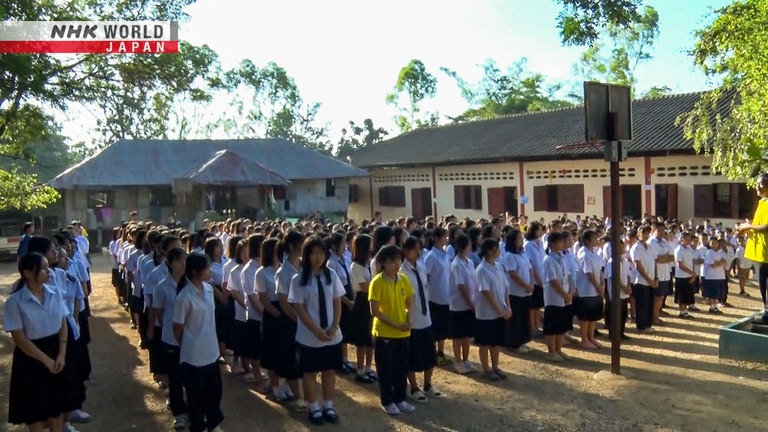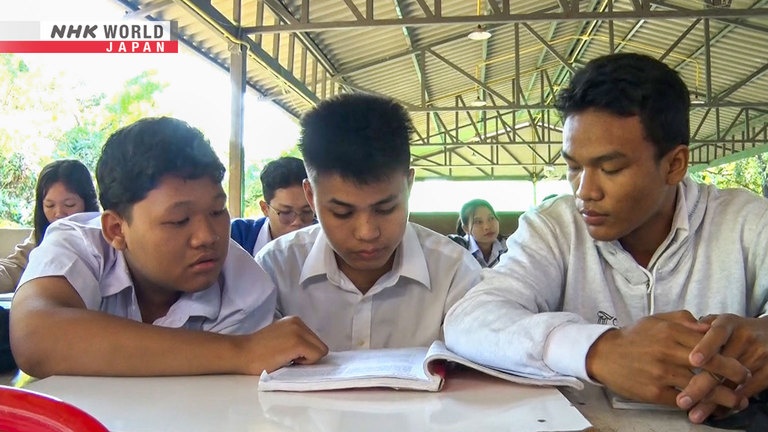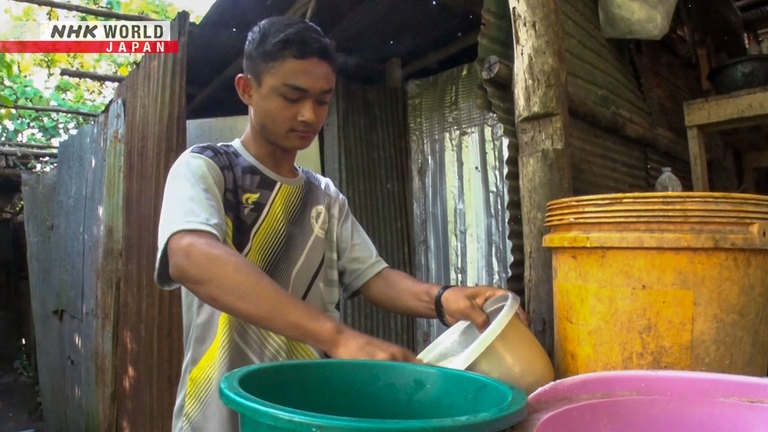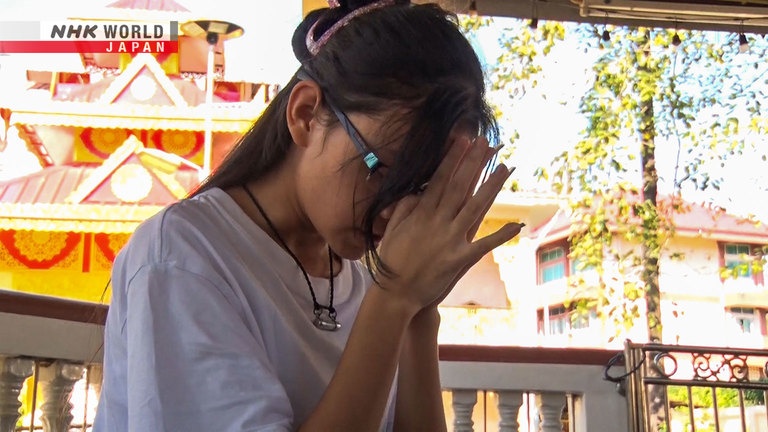A Border School of Hope: Mae Sot, Thailand
A school in Mae Sot, Thailand, located just across the border with Myanmar, shelters immigrant children of all ages, providing education to many who face the effects of poverty or the civil war.




Transcript
Looking up at the mountains of Myanmar is Thailand's northwestern city of Mae Sot.
It holds a long history of border trading, but due to factors such as the pandemic and the Myanmar coup d'état,
the national border has been closed for three years, finally being reopened in January of 2023.
The population of Mae Sot is around 120,000,
but there are also said to be an extremely large number of unregistered immigrants from Myanmar here.
Since the coup, refugees and members of the democratic movement fled into Thailand, and their numbers continue to grow.
Despite the borders being closed, many people from Myanmar have relocated to Mae Sot.
A school here educates children who left their home country to reside in Thailand.
Some fled with their parents, while others came alone.
Many arrived at the school with nowhere else to turn.
Education is closed off in Myanmar,
and we can't do anything there.
It doesn't make sense to go to a national
university when we're at war.
One young man joins his parents, who are migrant laborers in Thailand, for the good of his education.
I wanted to press on however
I possibly could.
Another young woman prays for the safety of her father, who is involved with the democratic movement in Myanmar.
I won't give up hope.
That would be accepting defeat.
In this episode, we visit the school that provides shelter to young people, whose lives have been uprooted by war.
Located a 15-minute drive from central Mae Sot, among the hills, is a school for children from Myanmar.
It's called the New Blood High School.
It was opened in 2003 by young immigrants from Myanmar, who sought to provide children with a proper place of learning.
Until the 2021 coup d'état in Myanmar began, its students numbered only 400, but in just two years their numbers have exceeded 700.
All of you have had the experience of attending
schools in both Myanmar and Thailand.
It will take knowledge and rationality to rebuild
the country, so I hope you'll play a part in that.
You can use your experiences to better
your home country.
Whether it be parents, siblings, or friends, many who attend this school have left someone or something behind.
The decision to leave home wasn't theirs to make.
The ages of attending children range from pre-school to high school age.
Although the school is referred to as a high school, it accepts young children, so that immigrant parents can more easily obtain work.
After the coup d'état, increasing requests came from within Myanmar, seeking a place for safe education of children.
The school resolved to do everything it could, and the teachers performed their own construction,
expanding the classrooms and readying a dormitory to house the arriving children.
The school now welcomes children already living in Mae Sot, as well as new students from Myanmar.
Both in terms of classrooms and teachers, their resources are pressed to the limit.
Some students had their houses burned down,
with nowhere left to live.
This is the only place they have.
Students involved with the democratic movement
could be jailed or executed if they returned.
We did all that we could to avoid that fate.
That's why our school has adapted
to accept many children.
They're the future of Myanmar.
The school attracts a diverse mix of children born in Mae Sot,
war orphans, and children who lost the opportunity for education in Myanmar.
-You're all from Myanmar?
-That's right.
-When did you come here?
-About five years ago.
I was born here.
Who brought you to the school?
My parents.
-When did you start?
-Three months ago.
I came here to study.
Naing Htet Lin transferred to the school in August, 2023.
His parents had been performing migrant labor in Mae Sot for the past nine years,
and at the time he had been living with his grandfather in a farming village, in southern Myanmar.
To catch up on the education he missed, he's started from a middle school curriculum.
Before the war, he was one of the most enthusiastic students in his class.
His grades were never short of excellent.
Most of the students living outside the dorms arrive and leave via the school bus.
Some children whose parents have been successful in work live within the city.
Others reside on the outskirts.
Their living environments and economic means differ.
Once the bus departs school, children begin getting off within five minutes.
After it has driven for 15 minutes, the only student left on it is Naing.
The bus finally arrives at the edge of a small settlement.
There don't appear to be any shops or conventional homes in the vicinity.
The community consists entirely of immigrants from Myanmar.
They pay land usage fees to the owners, and construct shed-like buildings in which to live.
Naing's family lives in the farthest building.
There was a university student who
taught me some Japanese.
-You wrote this yourself?
-That's right.
It's my name.
I usually sit here and study.
Sometimes I use this table.
Naing's father Tin Zaw Min is currently unemployed.
He sometimes performs day labor when there's an opportunity, and grows vegetables on nearby vacant land.
Most of the family's livelihood comes from his wife's street vending.
In Myanmar, required education extends only through elementary school.
Among Naing's friends, some children went to work instead of middle school, while others became monks, so as not to be a burden.
With financial support from his parents, Naing managed to enter middle school.
Why did you decide to move across
the border?
My parents were here,
and I wanted to learn.
After the pandemic began, the coup happened
and school shut down for two years.
During that time, I stayed in a temple.
What can I say? I just wanted to get
an education.
I wanted to press on however
I possibly could.
Naing's mother, Cho Thae, sells homemade sweets from a small stand.
Her monthly income of around $280 US dollars a month is less than half the average Thai income,
but one-and-a-half times the average in Myanmar.
She'd have no opportunity to earn so much in their rural hometown.
-Why did you bring Naing here?
-We were worried.
There was that, and he had a strong
desire to study.
So we thought we should do what we could
to support him.
But isn't it hard for you in Thailand?
It's better than in Myanmar.
We can make a living in factories here.
Of course, we'd like to go home, but only
if we could sustain our lives there.
Now that Naing lives together with his parents, they've changed their daily routine.
Together, they make the sweets that will go up for sale the next day.
Naing suggested their working together would lead to faster preparations and more stock.
Despite their economic instability, his parents helped him realize his goal of attending school,
and so he holds a deep sense of gratitude towards them.
At 4 AM each morning, the 200 students living in the dorms of New Blood High School begin their day.
They start by preparing their breakfast.
Some have no experience doing chores, as they had been living with their parents until recently.
On this day, two batches of food will be prepared in this large pot.
Even this is light preparation compared to other meals.
For dinner, several separate dishes need to be made.
-It's an early start.
-Yeah.
We all work together though,
so it isn't too hard.
From the cooking of meals, to cleaning, to carrying water, all of the work is carried out by students living in the dorms.
Everyone works together to support each other.
At this school, they're all treated as equals.
-Do you do this every day?
-Two teams are assigned each day.
There are eight teams each of boys and girls.
Boys and girls take turns cooking every day.
The teams not cooking are allowed to sleep until 5 AM, but in the early mornings, most students get up anyway to warm themselves.
-Is it colder here than in Myanmar?
-It sure is.
What do you talk about?
Whatever.
We can talk about anything we like.
There are four dormitories located on the school grounds.
All of them are filled to capacity.
Some children came voluntarily on study programs, but many others fled here after losing their families or facing political pressure.
Some are accepted into the dorms because of their parents' economic situations.
At 6 AM, the students leave the dorms and gather in lines.
It's time for breakfast.
On the menu today is the stir-fried egg and cucumber, that the students prepared early in the morning, along with fresh eggplant.
Tasty or not, no complaints are heard.
After all, the next day they'll be the ones cooking.
After the military coup, the school made a major change to its curriculum.
Previously classes had progressed based on required subjects in Myanmar, returning students home there to take standardized tests
that function as their high school graduation and university admission exams.
Now, they've changed it to an American high school equivalency certification.
This GED testing can be taken online, and if passed, students are certified to progress to universities not just in America,
but in any of the countries where the qualification is recognized.
The school has readied necessary tools such as computers, and puts an emphasis on English.
Students of the school first attempted to gain GED certification in 2022.
The result was a resounding victory, as all 47 who took the test passed it.
One teacher puts a particular emphasis on GED preparation: English language instructor Khun Giorni.
He himself is a graduate of New Blood High School.
After returning to Myanmar to attend and graduate from university,
he resolved to give something back to his old school, and became an instructor.
Before the pandemic, students would return home
in order to take the high school graduation exams.
But during those years, it was impossible
for them to go back.
On top of that, the coup d'état happened,
shattering their dreams.
We began focusing on the GED to provide
them with a new path.
They'll still face many other obstacles.
Studying abroad is hard for them.
Students can't even get the certification
of residence they need for approval.
News of the small school's testing achievement was covered by news outlets around the world.
It also reached the ears of young people in Myanmar.
Why did you enroll here?
I want to study to get my GED.
Education is closed off in Myanmar,
and we can't do anything there.
I'd been attending school, but I was worried
about what to do in the future.
It doesn't make sense to go to a national
university when we're at war.
How did you get to Thailand?
It wasn't easy. We had to navigate a remote
route going through the mountains.
When I arrived, I didn't know anything but
the school's name, so it was stressful.
We came together, because of the
political situation there.
What are your dreams for after certification?
I want to be a businesswoman.
I've loved drawing ever since I was a child,
so I'd like to be an architect.
I'm interested in politics, so I hope
to be a lawyer.
Women suffer discrimination in my home country,
and I want to join the fight against it.
When we get certification, we'll gain chances
that we wouldn't have elsewhere.
A new path leading to the world...
To the young people of Myanmar, this beacon of hope makes it worth navigating the winding mountain paths across the border.
Theint Thiri Bo is a graduate of New Blood High School.
She was one of the first class of students to obtain the GED there in 2022.
Currently she works in an orphanage.
Before she enrolled in the high school, she had moved among locations in the jungles of Myanmar with her father,
who was part of the democratic movement.
Theint wasn't involved in combat, but because her mother died of illness years ago,
it fell upon her to look after her two younger brothers.
I'd been living in the jungle without attending
school, hoping to aid the movement.
But my father urged me to get an education.
He said to me, "The future of the country
is in the hands of the young."
"Your duty should be to study, and then
to fulfill your responsibility when you grow up."
"Leave things here to the current adults."
Taking her father's words to heart, Theint brought her brothers over the border.
They stayed out of sight by walking along animal trails, climbing three mountains along the way.
We feared being forced to return to Myanmar,
but I was the eldest child.
I told myself that I couldn't
give in to fear.
-How was it when you reached the school?
-I felt so relieved.
I knew that I could go to school,
and live without constant worry.
I could finally study.
Once they reached the school, teachers were quick to provide them with the daily necessities and learning materials that they needed.
Her brothers wasted no time in making new friends.
She realized that she'd found an environment where she could live and learn in peace, upholding the promise she made to her father.
She got off to a late start, but learned the necessary subjects in just five months, and passed the exam.
And when you passed the test?
I was so happy that I cried.
The school recommended several options for
GED-certified students.
Things like studying abroad in South Korea
or Finland.
But due to personal reasons,
I couldn't pursue them.
I don't have legal documents, a passport,
or a certificate of residence.
I don't even have a national ID.
Neither scholarship organizations nor universities
could consider me.
What's that pendant?
My mother's ashes are inside.
She's always with me.
Do you ever feel like you've lost hope?
Never. I'll keep searching for a way.
Ultimately, among the 47 students who gained GED certification in 2022, only seven could progress to university.
Among those who couldn't were people like Theint, who lacked necessary paperwork, and those unable to afford further education.
Although their current options are constrained by their former circumstances, education has given them all a glimpse of a new future.
After eating dinner, the students change into the traditional garb of longyi, and gather once more.
Myanmar is well known as being a predominantly Buddhist nation.
Most children there are taught sutras, and families gather in the mornings and evenings for prayer.
To the students, this time each day connects them with their families.
Once prayer has finished, the lights go back on in the classrooms.
Night classes are conducted from 7 to 9 PM.
In 2023, the number of students to take Myanmar's standardized graduation exam was just a quarter the number of five years ago.
As Myanmar's education system verges on collapse, young people cross the border to obtain their education in a different nation.
While they come to grips with reality, they dream of a future in which they can safely return to their homeland.